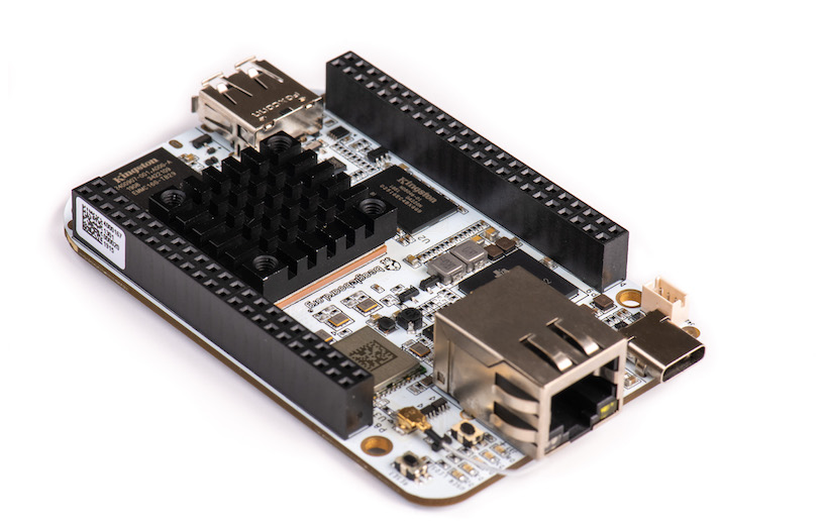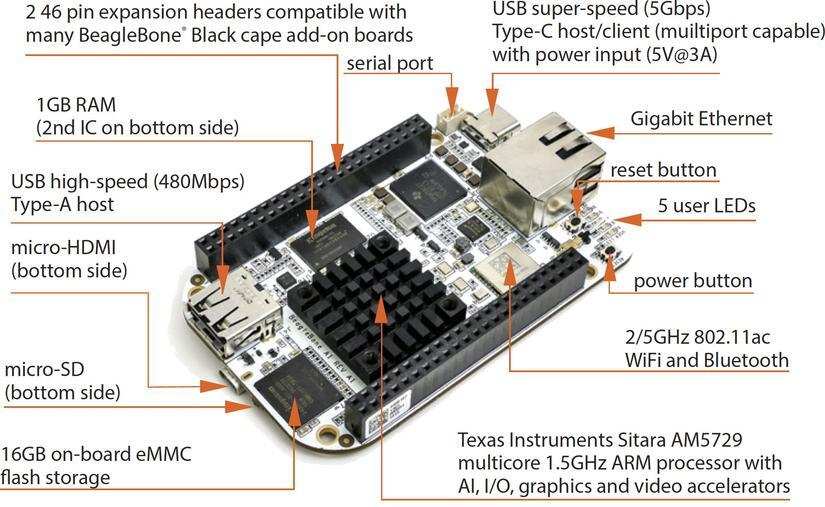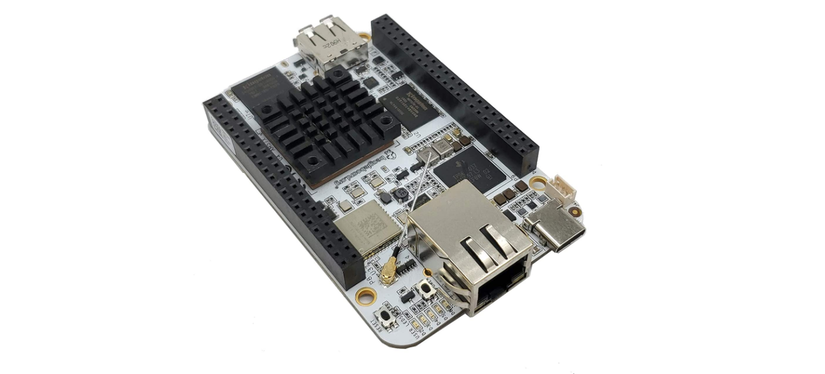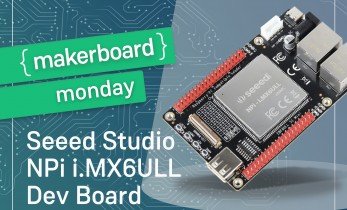BeagleBone AI Specs and More
Single-board computers have changed radically in recent years. There used to be a big divide between industrial SBCs for automation and interactive use and hobby boards like the Raspberry Pi. These days, it seems that almost every hobby board has an Artificial Intelligence (AI) variant, and previously industry only vendors are reaching out to the hobby market.
The BeagleBone AI from BeagleBoard is a small, powerful SBC based on the Texas Instruments AM5729 System on Chip (SoC). It's aimed at developers wanting to incorporate edge-computing – AI inference using pre-trained Neural Networks – into their embedded devices.

BeagleBoard's commitment to open-source hardware and software make this quite an exciting prospect. The BeagleBone way of working can be more straightforward than other similar SBCs, with the option to connect directly via USB, or where available Ethernet and Wi-Fi and code directly in the browser cuts away some of the steps needed to get started using the board.
The BeagleBone AI adds standalone keyboard and mouse support, connecting to a monitor via a micro HDMI to HDMI cable.
At $115 USD, it's similar in price to other SBCs for edge-computing, most notably the Jetson Nano from Nvidia. It's also going up against the Coral Dev board from Google.
Should You Get a BeagleBone AI?
The BeagleBone AI is an incredible board for its size, and there is much to love about BeagleBoard as a whole, but should you buy one?

Probably not. It pains me to say it too. I love BeagleBoard, but the BeagleBone AI seems trapped between two extremes. If you are looking for a capable SBC to learn about Artificial Intelligence, the Nvidia Jetson Nano and the Google Coral Dev boards are cheaper and more flexible.
On the other hand, if you already work with AI and are looking to create an embedded edge-computing device, you probably are already familiar with a framework, and it probably isn't Texas Instruments' Deep Learning tools. That, combined with the relatively underpowered BeagleBone AI when compared to its competitors, makes it an unlikely choice.
The BeagleBone AI Specifications
Despite the verdict above, the BeagleBone AI is an impressive machine for its size:
- CPU: Texas Instruments Sitara AM5729 (featuring Dual Arm® Cortex®-A15 microprocessor subsystem, 2 x dual Arm® Cortex®-M4 co-processors, and 4x Embedded Vision Engines (EVEs))
- RAM: 1GB RAM
- Storage: 16GB onboard eMMC flash with high-speed interface
- USB: USB Type-C for power and superspeed dual-role controller; and USB type-A host
- Connectivity: Gigabit Ethernet, 2.4/5GHz WiFi, and Bluetooth
- Display: micro HDMI
- I/O: BeagleBone Black mechanical and header compatibility
- Software: Debian GNU/Linux
Artificial Intelligence on the Edge
Performing inference "on the edge" is quickly becoming the standard in Artificial Intelligence. It makes sense, as pre-trained neural networks are perfect for performing simple tasks using less powerful hardware, and don't rely on a cloud service to get results. Low-powered, cheap hardware can then be placed in various devices and deployed to places where previously it wouldn't have been possible to use the technology.
BeagleBoard AI specializes in computer vision, the act of recognizing objects and features (like defective items on a production line, or faces). As the above video shows, the TIDL tools provided with the BeagleBoneAI make getting started with basic object recognition reasonably easy.
That said, most AI focussed SBCs provide similarly easy getting started guides, and as previously mentioned, the TIDL suite isn't as well documented for newcomers as other similar options.
BeagleBone AI: The New Hotness

Another issue with the BeagleBone AI is its operating temperature. Almost all other AI focussed SBCs come with a fan or a beefy heatsink. The BeagleBone AI relies on passive cooling from the body of the SoC, and according to multiple users, it runs pretty hot even doing relatively simple tasks. This can be mitigated with the addition of a fan, but you are already adding costs to the $115 USD asking price.
Bela with the BeagleBone AI
One aspect of BeagleBoards that has always held my interest is that the Bela platform is based on it. Both the Bela and Bela Mini only work with the Beaglebone Black and Pocketbeagle, respectively. While there are other SBC libraries and hardware solutions for interactive music production, nothing quite comes close to Bela in terms of functionality.
We've covered the Bela Mini in a previous Maker Board Monday, and I make no attempt to hide how much I love both the platform and the team behind it.
Unsurprisingly, members of the Bela team are working to make Bela compatible with the BeagleBone AI. They are close, and once it's fully integrated it's going to open some interesting doors. The Bela community is already creating incredible music and sound art using sensors. The addition of AI inference will create some truly interesting art and research. It is the one thing that I find unique about BeagleBone AI.
Suppose this article's purpose was to judge BeagleBone AI as a potential backbone for artistic expression through Bela. In that case, it'd be the only board of its type, and I'll be watching developments in this area with great interest.
BeagleBone AI: Great Board, Bad Timing
The BeagleBone AI is a fantastic board, both in its hardware design and the integration of the TIDL tools into the BeagleBoard custom Debian distribution. The only reason it suffers is due to the competition in faces at a similar price.
There was a time when BeagleBoards were the most impressive things you could buy. It's easy to forget that they even predated the Raspberry Pi. For a while, they were the only option for hobbyists looking for the I/O of a microcontroller mixed with an embedded Linux system. If BeagleBone AI had been in the first wave of AI capable SBCs, it would be likely a different story.
The entire philosophy behind BeagleBoard is fantastic, but unless you are already invested in the BeagleBoard ecosystem, the BeagleBone AI might not be the board you are looking for.










































Leave your feedback...